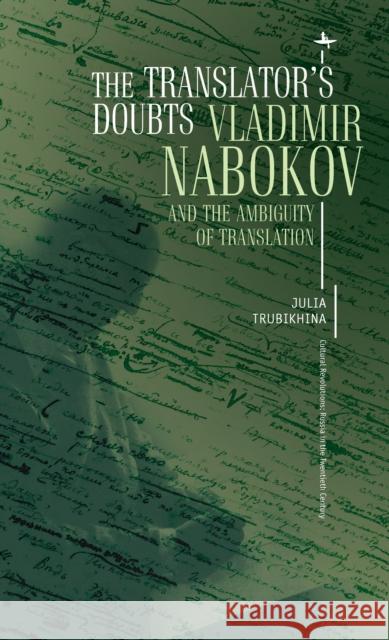The Translator's Doubts: Vladimir Nabokov and the Ambiguity of Translation » książka
The Translator's Doubts: Vladimir Nabokov and the Ambiguity of Translation
ISBN-13: 9781618112606 / Angielski / Twarda / 2015 / 248 str.
The Translator's Doubts: Vladimir Nabokov and the Ambiguity of Translation
ISBN-13: 9781618112606 / Angielski / Twarda / 2015 / 248 str.
(netto: 527,69 VAT: 5%)
Najniższa cena z 30 dni: 406,99
ok. 16-18 dni roboczych.
Darmowa dostawa!
Using Vladimir Nabokov as its "case study," this volume approaches translation as a crucial avenue into literary history and theory, philosophy and interpretation. The book attempts to bring together issues in translation and the shift in Nabokov studies from its earlier emphasis on the "metaliterary" to the more recent "metaphysical" approach. Addressing specific texts (both literary and cinematic), the book investigates Nabokov's deeply ambivalent relationship to translation as a hermeneutic oscillation on his part between the relative stability of meaning, which expresses itself philosophically as a faith in the beyond, and deep metaphysical uncertainty. While Nabokov's practice of translation changes profoundly over the course of his career, his adherence to the Romantic notion of a "true" but ultimately elusive metaphysical language remained paradoxically constant.
"The Translators Doubts" singles out translation as a way of talking about literary history and theory, philosophy, and interpretation, with the work of Vladimir Nabokov as its "case study." It is hard to separate Nabokov from the act of translation, in all senses of the word--ranging from "moving across" geographical borders and cultural and linguistic boundaries to the transferring of the split between "here" and "there" and "then" and "now." Investigating translation as a transformational rather than mimetic experience allows us to understand the strikingly original end-result: in what emerges, both the "target language" and the "native" language undergo something new that dispenses with the quest for and the "anxiety" of influences. In this sense Nabokov constitutes a perfect object for comparativist study since his oeuvre offers us the unique opportunity to look at his major texts twice: as originals and as translations.











